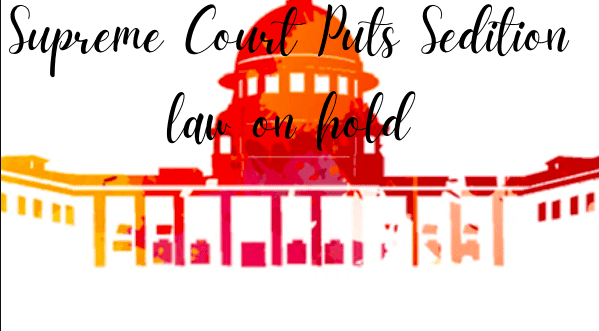In a land mark Judment Hon’ble Supreme court puts sediction law on hold on 11 may 2022
Supreme Court Puts Sedition law on hold
Sedition law is on hold by hon’ble supreme court and further it was directed by apex court that no new FIRs to be lodged till review is completed by the centre.

On Tuesday may 10th 2022 , the apex court had sought the Centre’s response on putting the law in abeyance in the interest of the people till it completes the re-examination of the law.
The Supreme Court on Wednesday ie today (11th may 2022) put on hold the old-era penal provision of sedition and asked the Centre and state governments to refrain from registering any further FIRs under the provision of sedition , Section 124A of the Indian Penal Code, till review of the law by Centre is complete.
The bench, also comprising Justices Surya Kant and Hima Kohli, said: “It will be appropriate not to use this provision of law till further re-examination is over. We hope and expect the Centre and states will desist from registering any FIR under Section 124A or initiate proceedings, till the re-examination is over”. The Hon’ble Supreme Court also stated that the Centre has the authority to issue new directives to state governments, and that the hearing of petitions challenging the constitutionality of the sedition statute will take place in the third week of July.
One of the petitioners, senior counsel Kapil Sibal, said that Section 124A has become prima facie illegal, and that the highest court should freeze the application of the sedition provision until the Centre examines it.
In terms of existing cases, Mehta stated that the intensity of each case is unknown, that there may be a terror element, and that the cases are currently before a court body. “We have to have faith in the courts,” he added.
“What is this argument…Can it be struck down today?” Justice Kant asked Sibal. In light of the Centre’s request, the bench said that it is looking for an answer from an impartial authority and asked Sibal how an interim arrangement might be made.
The Supreme Court had requested a statement from the Centre on ongoing and potential sedition cases on Tuesday.
The Ministry of Home Affairs stated in its affidavit that the Prime Minister of India is aware of various views expressed on the subject and has also expressed his clear and unequivocal views in favour of protecting civil liberties, respecting human rights, and providing constitutionally cherished freedoms to the people of India on a regular basis in various forums.
The Prime Minister has consistently stated that one of India’s assets is the many thought streams that bloom in the country, according to the home ministry.
According to the ministry, the Prime Minister feels that while the country celebrates Azadi Ka Amrit Mahotsav (75 years of independence), it is critical for the country to work harder to eliminate colonial baggage that has outlived its usefulness, such as outmoded colonial laws and practises.
“The Government of India, fully cognizant of various viewpoints on the subject of sedition, as well as concerns about civil liberties and human rights, has decided to re-examine and re-consider the provisions, while remaining committed to maintaining and protecting the sovereignty and integrity of this nation.”
FAQ :-
- What is Sediction Law meaning in India ?
Section 124A of Indian penal Code, 1860 defines sedition as: “Whoever, by words, either spoken or written, or by signs, or by visible representation, or otherwise, brings or attempts to bring into hatred or contempt, or excites or attempts to excite disaffection towards, the Government established by law shall be punished with imprisonment for life, to which fine may be added…”
2.When was the Sedition Act passed in India?
Section 124A of the Indian Penal Code lays down the punishment for sedition in India . The Indian Penal Code was came into recognition in 1860, under the British Raj.
3. What is new law of sedition ?
The government of india, in a great major turnaround, announced its major big decision to review the sedition law that it is pertinent to mention that this law was once used against Mahatma Gandhi and Lokmanya Bal Gangadhar Tilak by the Britishers. The law allows arrest without a warrant if a person is accused of anti-government activities. This law is basically against principle of natural justice.
4. How is sedition punishable?
Its acriminal offence punishable with a maximum sentence of life imprisonment. The procedure laid down in CrPC is followed to punish a person for sedition offence.
5. Why supreme court put Sedition law on hold ?
Its basically done in interest of public as this law seems to be against principle of natural justice that is audi alteram partem its basically a Latin phrase meaning “listen to the other side”, or “let the other side be heard as well”
#Supreme Court Puts Sedition law on hold
#Seditionlawonhold












